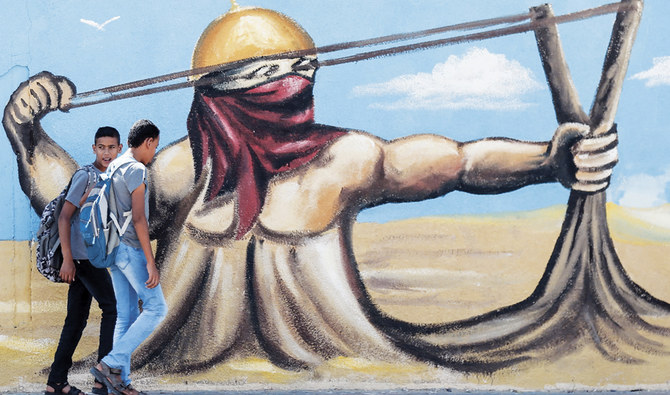GAZA CITY: Palestinians in the Gaza Strip have been following the Israeli elections, at the level of factions and individuals, without expecting any serious change in Israeli policy toward them from either bloc after the formation of a new government.
Abdel Latif Al-Qanoua, a Hamas spokesman in Gaza, said: “The elections under occupation do not mean much to us as all Israeli governments have been two sides of the same coin.
“The leaders of the occupation are competing in their elections to show hostility and hatred for our Palestinian people.”
Hamas and Israel reached understandings at the end of last year, under Egyptian auspices, to ease the Israeli blockade of the Gaza Strip and provide facilities in exchange for ending border demonstrations that have been taking place since March last year.
The Popular Front for the Liberation of Palestine (PFLP) said in a press statement: “The results of the occupation elections, regardless of the progress of this party or that, will not change the reality of the occupation on the ground.
“There is no difference in the program of the (Israeli Prime Minister Benjamin) Netanyahu from the criminal leaders, their hands stained with the blood of our people, such as (Israeli politician Benny) Gantz, (former Israeli PM Ehud) Barak or (former Israeli Defense Minister Avigdor) Lieberman.
“Even the Meretz party that intersects with the Zionist right on the Judaization of Jerusalem, the recognition of the Jewish state and ending the issue of refugees; there is a consensus within these parties to liquidate the rights of our people,” the PFLP added.
Gaza constituted an important area in the electoral campaign of the various Israeli parties, and there were many suggestions among competing groups on the best way to deal with the Gaza Strip.
The final results of Israeli elections showed that a blue white party led by Gantz won one seat more than the Likud party headed by Netanyahu, and the inability of either the right or center-left bloc to form the government alone, while the Yisrael Beiteinu party headed by Lieberman won eight seats.
Ordinary Palestinians in the Gaza Strip have shown no trade-off between Israeli parties in dealing with the Gaza Strip.
“Our interest in the Israeli elections is normal, but the trade-off between who will form the next Israeli government is of no value,” said Sami Masalmi, 34.
“The big differences among the Israeli parties are internal issues in Israel. As far as we are concerned, there are very few differences among them on our issues. There is perhaps one strategy, but the tactics in implementation are different,” Masalmi told Arab News.
The Gaza Strip has seen three wars with Israel over the past decade, most recently in 2014 when Netanyahu was premier and Gantz the chief of staff.
Dalia Masoud, 26, said: “Whatever happens in the coming days, Palestinians in the West Bank and Gaza Strip will experience Israeli aggression and a government formation by Gantz or Netanyahu will not change the reality on the ground.”
On social media platforms, a hashtag appeared in which Palestinians called for their own elections and for Palestinian leaders to give their people a chance to choose their representatives, as in Israel.
“We are following the Israeli elections and our hearts are hurting because our enemy is living a democratic life while we have had no elections for many years and there is no prospect of them being held in the near future,” said Ali Alian, 30.
“Yes, there are differences among the Israeli leaders, but there will be no mercy among them toward the Palestinians. They all use the big stick toward us.”
Saleh Al-Naami, a Palestinian specialist on Israeli affairs, said: “Gaza will be a top priority of the next Israeli government, regardless of its party structure, because Lieberman and his party will be the dome of the balance in the formation of any government, and Lieberman put the issue of resolving the confrontation with Gaza a priority ahead of confronting Iran and Hezbollah.”
He added: “Moreover, the leaders of all the parties that will participate in the coalition have constrained themselves with commitments to confront Gaza.”

























